重点汇总 五年级英语下册UNIT 3和UNIT 4
五年级下册英语六个单元的,知识

五年级下册英语六个单元的,知识
以下是五年级下册英语六个单元的知识点总结:
1. 第一单元:重点词汇包括clock(钟)、o'clock(整点)、morni ng(早上)、afternoon(下午)、evening(晚上)等。
本单元主要学习时间表达和日常活动。
2. 第二单元:重点词汇有动物名称,如:cat(猫)、dog(狗)、p anda(熊猫)等,以及描述动物特征的形容词。
本单元主要学习动物及其特点。
3. 第三单元:重点词汇包括水果名称,如:apple(苹果)、orange (橙子)、banana(香蕉)等。
本单元主要学习水果名称和喜好。
4. 第四单元:重点词汇有家庭成员称呼,如:father(父亲)、mot her(母亲)、brother(兄弟)、sister(姐妹)等。
本单元主要学习家庭关系和称呼。
5. 第五单元:重点词汇包括颜色,如:red(红色)、blue(蓝色)、green(绿色)等。
本单元主要学习颜色及其表达。
6. 第六单元:重点词汇有天气词汇,如:sunny(晴朗的)、rainy (下雨的)、windy(刮风的)等。
本单元主要学习天气描述和日常活动安排。
每个单元的知识点均围绕重点词汇展开,通过学习这些词汇,学生可以提高英语听说读写能力。
请注意,这些知识点仅供参考,具体教学内容可能因教材版本和教学计划而有所不同。
五年级下册1~4单元英语知识点
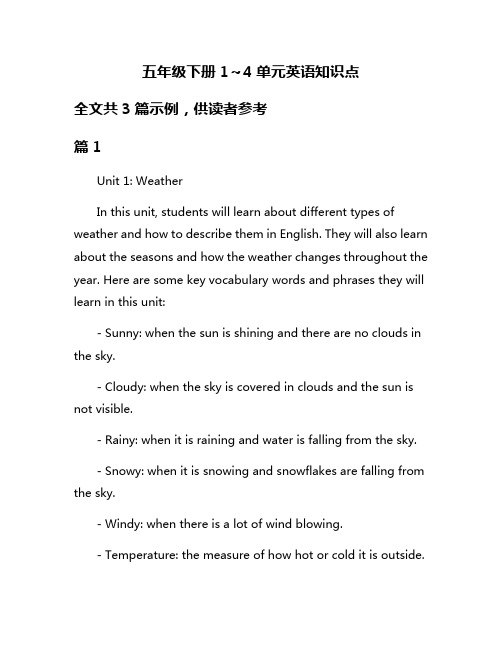
五年级下册1~4单元英语知识点全文共3篇示例,供读者参考篇1Unit 1: WeatherIn this unit, students will learn about different types of weather and how to describe them in English. They will also learn about the seasons and how the weather changes throughout the year. Here are some key vocabulary words and phrases they will learn in this unit:- Sunny: when the sun is shining and there are no clouds in the sky.- Cloudy: when the sky is covered in clouds and the sun is not visible.- Rainy: when it is raining and water is falling from the sky.- Snowy: when it is snowing and snowflakes are falling from the sky.- Windy: when there is a lot of wind blowing.- Temperature: the measure of how hot or cold it is outside.- Forecast: a prediction of what the weather will be like in the future.- Season: one of the four parts of the year – spring, summer, fall, or winter.Students will practice using these words and phrases to describe the weather in their own city and learn how to read a weather forecast to plan for the day.Unit 2: AnimalsIn this unit, students will learn about different animals and their habitats. They will practice using vocabulary words to describe animals and their characteristics. Here are some key vocabulary words and phrases they will learn in this unit:- Mammal: an animal that gives birth to live young and feeds them with milk.- Reptile: an animal that is covered in scales and lays eggs.- Amphibian: an animal that can live both on land and in water.- Habitat: the natural environment where an animal lives.- Predator: an animal that hunts and kills other animals for food.- Prey: an animal that is hunted and killed by another animal for food.- Endangered: a species of animal that is at risk of becoming extinct.- Adaptation: a physical or behavioral trait that helps an animal survive in its environment.Students will learn about different types of animals, their habitats, and how they have adapted to survive in their environments.Unit 3: FoodIn this unit, students will learn about different types of food and how to talk about their likes and dislikes. They will also learn about healthy eating habits and the importance of a balanced diet. Here are some key vocabulary words and phrases they will learn in this unit:- Breakfast: the first meal of the day.- Lunch: a meal that is eaten in the middle of the day.- Dinner: the last meal of the day.- Snack: a small amount of food eaten between meals.- Fruit: a sweet and fleshy product of a tree or plant that is eaten as food.- Vegetable: a plant or part of a plant that is used as food.- Protein: a nutrient that is essential for building and repairing tissues in the body.- Carbohydrates: a nutrient that provides energy for the body.- Vitamins: essential nutrients that help the body function properly.Students will practice talking about their favorite foods, cooking habits, and the importance of eating a balanced diet for good health.Unit 4: My TownIn this unit, students will learn how to talk about their town or city in English. They will learn how to give directions, describe landmarks and attractions, and talk about their favorite places to visit. Here are some key vocabulary words and phrases they will learn in this unit:- Street: a public road in a town or city.- Intersection: the place where two streets cross each other.- Landmark: a prominent object or feature that is easily recognizable and used as a point of reference.- Park: a public area with grass, trees, and benches for people to relax and play.- Museum: a building where objects of artistic, cultural, historical, or scientific interest are stored and exhibited.- Library: a building or room containing collections of books and other sources of information.- Theater: a building or outdoor area in which plays and other dramatic performances are given.- Market: a place where goods are bought and sold, typically outdoors.Students will practice giving directions, describing their town or city, and talking about the different places they like to visit. They will also learn how to ask for and follow directions to navigate their town or city.篇2Unit 1: Let's CelebrateIn this unit, students will learn about different celebrations, such as birthdays, holidays, and cultural festivals. They will alsolearn how to talk about their own birthdays and celebrations, as well as ask and answer questions about others' celebrations.Vocabulary:- Birthday- Cake- Presents- Party- Holiday- Christmas- Easter- Thanksgiving- Festival- TraditionGrammar:- Simple present tense- Questions with "Wh-" words- Possessive adjectives (my, your, his, her, our, their)Example dialogue:A: When is your birthday?B: My birthday is on September 10th.A: Do you have a birthday party?B: Yes, I have a party with my friends and family.Unit 2: Let's Learn English!In this unit, students will focus on learning vocabulary related to school subjects, classroom objects, and daily routines. They will also practice asking and answering questions about their favorite subjects and daily activities.Vocabulary:- English- Math- Science- Art- Music- P.E.- Notebook- Pencil- RulerGrammar:- Present continuous tense- Questions with "Do/Does"Example dialogue:A: What subjects do you have today?B: I have English, Math, and Science.A: Do you like English?B: Yes, I like English. It's my favorite subject.Unit 3: Let's Explore NatureIn this unit, students will learn about different animals, plants, and natural habitats. They will also practice describing animals and their habitats, as well as talking about their favorite animals and outdoor activities.Vocabulary:- Animal- Fish- Insect- Plant- Flower- Tree- Forest- Ocean- MountainGrammar:- Comparative adjectives- Superlative adjectivesExample dialogue:A: What's your favorite animal?B: My favorite animal is a lion. It's the biggest animal in the zoo.A: Do you like birds or fish better?B: I like birds better. They can fly in the sky.Unit 4: Let's TravelIn this unit, students will learn about different modes of transportation, countries, and landmarks around the world. They will also practice talking about their travel experiences, as well as asking for and giving directions.Vocabulary:- Plane- Train- Car- Bus- Boat- Country- City- Landmark- Map- DirectionGrammar:- Prepositions of place- Imperatives for giving directionsExample dialogue:A: How did you get to school today?B: I took the bus.A: Can you tell me how to get to the library?B: Go straight ahead, then turn left at the second intersection.Overall, these four units cover a wide range of topics and grammar points that are essential for fifth-grade students to communicate effectively in English. By practicing vocabulary, grammar, and dialogues, students will be able to improve their listening, speaking, reading, and writing skills in English.篇3Unit 1: The World of AnimalsIn Unit 1 of the fifth grade English textbook, students will learn about different animals and their habitats. They will be introduced to vocabulary related to animals, such as mammals, reptiles, amphibians, birds, and fish. Students will also learn howto describe animals using adjectives and how to classify them based on their characteristics.Key Knowledge Points:1. Animal Classification- Mammals: Animals that have hair or fur, give birth to live young, and feed their young with milk.- Reptiles: Animals that have dry scaly skin and lay eggs.- Amphibians: Animals that can live both on land and in water, such as frogs and toads.- Birds: Animals with feathers, wings, and beaks that lay eggs.- Fish: Animals that live in water and have gills for breathing.2. Animal Habitats- Students will learn about different habitats where animals live, such as forests, rivers, oceans, and deserts.- They will understand how animals adapt to their environments to survive.Unit 2: My Health and Well-beingUnit 2 focuses on health and well-being, where students will learn about parts of the body, healthy habits, and ways to stay fit and active. They will be introduced to vocabulary related to body parts, healthy foods, exercise, and personal hygiene.Key Knowledge Points:1. Parts of the Body- Students will learn the names of different body parts, including head, shoulders, knees, and toes.- They will understand the functions of each body part and how to take care of them.2. Healthy Habits- Students will learn about the importance of eating nutritious foods, drinking plenty of water, getting enough sleep, and exercising regularly.- They will be able to discuss the benefits of maintaining a healthy lifestyle.Unit 3: Our Natural WorldIn Unit 3, students will explore the natural world and learn about ecosystems, weather, and the environment. They will beintroduced to vocabulary related to weather patterns, plants, animals, and conservation efforts.Key Knowledge Points:1. Ecosystems- Students will learn about different ecosystems, such as forests, grasslands, and wetlands.- They will understand how plants and animals interact in these ecosystems to maintain a balance.2. Weather- Students will learn about different types of weather, including sunny, cloudy, rainy, and windy.- They will be able to describe weather patterns and how they affect our daily lives.Unit 4: The Art of StorytellingIn Unit 4, students will explore the art of storytelling and learn about different types of stories, such as myths, fables, and legends. They will be introduced to vocabulary related to storytelling, characters, settings, and plot.Key Knowledge Points:1. Types of Stories- Students will learn about myths, which are traditional stories that explain natural phenomena.- They will understand fables, which are short stories that teach moral lessons using animals as characters.- Students will explore legends, which are stories based on real events or people that have been passed down through generations.2. Story Elements- Students will learn about the elements of a story, such as characters, settings, and plot.- They will be able to analyze the structure of a story and identify key components.Overall, these four units in the fifth-grade English textbook aim to enhance students' language skills in various contexts while providing them with valuable knowledge about the world around them. Through engaging activities and interesting topics, students will be able to improve their English proficiency and expand their global awareness.。
译林英语五年级下册3、4单元知识点整理

译林版英语五年级上册知识点整理3、4单元Unit 3 Our animal friends一、词汇our animal friends 我们的动物朋友two fish 两条鱼the other 另一个a big tail 一条大尾巴big bodies 大身体have no 没有four legs 四条腿nice wings 漂亮的翅膀red eyes 红眼睛long ears 长耳朵big arms 大手臂bigfeet 大脚its body 它的身体your fingers 你的手指on the farm 在农场上☆bald eagles 白头秃鹰☆polar bears 北极熊☆a big kangaroo 一只袋鼠☆in Canada 在加拿大☆in Australia 在澳大利亚☆like the rain 喜欢下雨☆sunny weather 晴朗的天气☆come out 出来☆carry an umbrella 拿一把雨伞二、句型1. I have two animal friends. 我有两个动物朋友。
2. One is red and the other is black. 一个是红的另一个是黑的。
3. They have big eyes and big bodies. 它们有大眼睛和大身体。
4. They have no legs and arms. 它们没有腿和手臂。
5. It has four legs and a short tail. 他有四条腿和一条短尾巴。
6. It has two legs and two nice wings. 它有两条腿和一双漂亮的翅膀。
7. He has a dog. 他有一只狗。
8. She has a bird. 她有一只鸟。
9. It can talk and fly. 它既会说话又会飞。
10. Do you have an animal friend? Yes, I do. 你有一个动物朋友吗?是的,我有。
五年级下册英语知识点归纳1~4单元
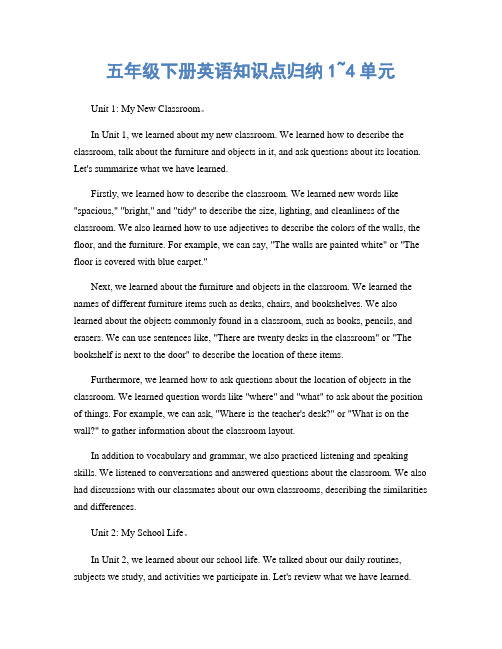
五年级下册英语知识点归纳1~4单元Unit 1: My New Classroom。
In Unit 1, we learned about my new classroom. We learned how to describe the classroom, talk about the furniture and objects in it, and ask questions about its location. Let's summarize what we have learned.Firstly, we learned how to describe the classroom. We learned new words like "spacious," "bright," and "tidy" to describe the size, lighting, and cleanliness of the classroom. We also learned how to use adjectives to describe the colors of the walls, the floor, and the furniture. For example, we can say, "The walls are painted white" or "The floor is covered with blue carpet."Next, we learned about the furniture and objects in the classroom. We learned the names of different furniture items such as desks, chairs, and bookshelves. We also learned about the objects commonly found in a classroom, such as books, pencils, and erasers. We can use sentences like, "There are twenty desks in the classroom" or "The bookshelf is next to the door" to describe the location of these items.Furthermore, we learned how to ask questions about the location of objects in the classroom. We learned question words like "where" and "what" to ask about the position of things. For example, we can ask, "Where is the teacher's desk?" or "What is on the wall?" to gather information about the classroom layout.In addition to vocabulary and grammar, we also practiced listening and speaking skills. We listened to conversations and answered questions about the classroom. We also had discussions with our classmates about our own classrooms, describing the similarities and differences.Unit 2: My School Life。
新5下三四单元知识点汇总
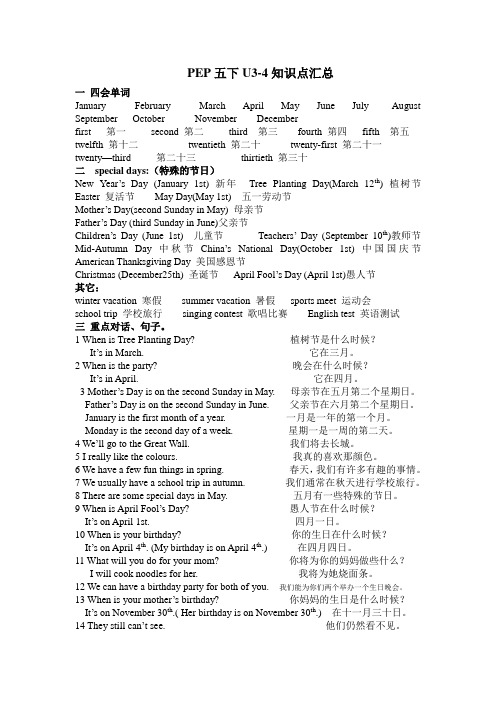
PEP五下U3-4知识点汇总一四会单词January February March April May June July August September October November Decemberfirst 第一second 第二third 第三fourth 第四fifth 第五twelfth 第十二twentieth 第二十twenty-first 第二十一twenty—third 第二十三thirtieth 第三十二special days:(特殊的节日)New Year’s Day (January 1st) 新年Tree Planting Day(March 12th) 植树节Easter 复活节May Day(May 1st) 五一劳动节Mother’s Day(second Sunday in May) 母亲节Father’s Day (third Sunday in June)父亲节Children’s Day (June 1st) 儿童节Teachers’Day (September 10th)教师节Mid-Autumn Day 中秋节China’s National Day(October 1st) 中国国庆节American Thanksgiving Day 美国感恩节Christmas (December25th) 圣诞节April Fool’s Day (April 1st)愚人节其它:winter vacation 寒假summer vacation 暑假sports meet 运动会school trip 学校旅行singing contest 歌唱比赛English test 英语测试三重点对话、句子。
1 When is Tree Planting Day? 植树节是什么时候?It’s in March. 它在三月。
2 When is the party? 晚会在什么时候?It’s in April. 它在四月。
人教版小学英语五年级下册第三,四单元知识梳理

人教版小学英语五年级下册第三,四单元知识梳理第三单元:一、重点词汇January一月 February二月 March三月 April四月 May五月 June六月July七月 August 八月 September 九月October十月 November 十一月December十二月注意:1、月份的首字母一定要大写。
2、May没有缩写形式,September的缩写形式是“Sept”,其他月份单词的缩写形式都是有单词的前三个字母加“·”构成。
3、月份的缩写形式不用在句子中,只能单独使用。
4、表示“在几月”时,要在月份单词前面加介词in。
二、常用节假日名称。
New Year’s Day元旦 Tree Planting Day 植树节 Easter 复活节April Fool’s Day愚人节 May Day 劳动节 Mother’s Day 母亲节Children’s Day 儿童节 Father’s Day父亲节Teacher’s Day教师节 National Day国庆节Mid-Autumn Day 中秋节Thanksgiving Day 感恩节 Christmas圣诞节 summer vacation暑假 winter vacation寒假三、活动名称sports meet 运动会 Easter party 复活节聚会 school trip 学校旅行Chinese test 语文测试 singing contest歌咏比赛 birthday party生日聚会四、介词in 、on、 at的用法。
1、in的用法。
in后面+上午/下午/晚上/月份/季节/年份。
如:in the morning, in April, in winter, in 2015.2、on的用法。
on的后面+具体的某一天。
如:on Monday, on April 3rd, on Friday morning.3、at的用法。
五年级下册英语素材-unit3-4 复习知识点 译林版
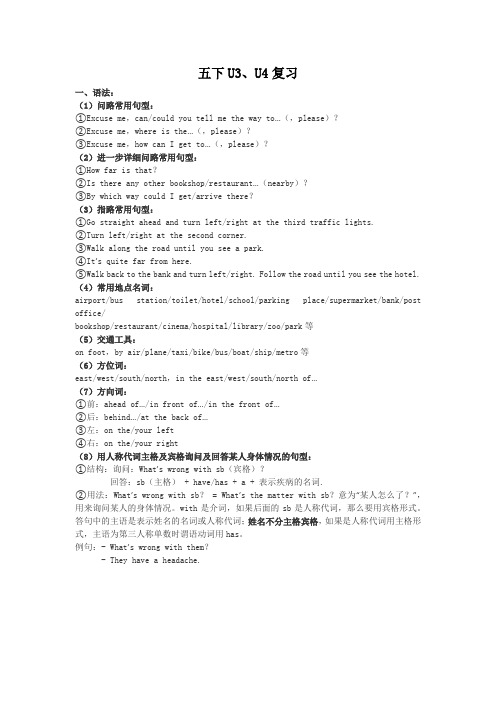
五下U3、U4复习一、语法:(1)问路常用句型:①Excuse me,can/could you tell me the way to…(,please)?②Excuse me,where is the…(,please)?③Excuse me,how can I get to…(,please)?(2)进一步详细问路常用句型:①How far is that?②Is there any other bookshop/restaurant…(nearby)?③By which way could I get/arrive there?(3)指路常用句型:①Go straight ahead and turn left/right at the third traffic lights.②Turn left/right at the second corner.③Walk along the road until you see a park.④It’s quite far from here.⑤Walk back to the bank and turn left/right. Follow the road until you see the hotel. (4)常用地点名词:airport/bus station/toilet/hotel/school/parking place/supermarket/bank/post office/bookshop/restaurant/cinema/hospital/library/zoo/park等(5)交通工具:on foot,by air/plane/taxi/bike/bus/boat/ship/metro等(6)方位词:east/west/south/north,in the east/west/south/north of…(7)方向词:①前:ahead of…/in front of…/in the front of…②后:behind…/at the back of…③左:on the/your left④右:on the/your right(8)用人称代词主格及宾格询问及回答某人身体情况的句型:①结构:询问:What’s wrong with sb(宾格)?回答:sb(主格) + have/has + a + 表示疾病的名词.②用法:What’s wrong with sb? = What’s the matter with sb?意为“某人怎么了?”,用来询问某人的身体情况。
PEP小学英语五年级下册各单元重点内容概述
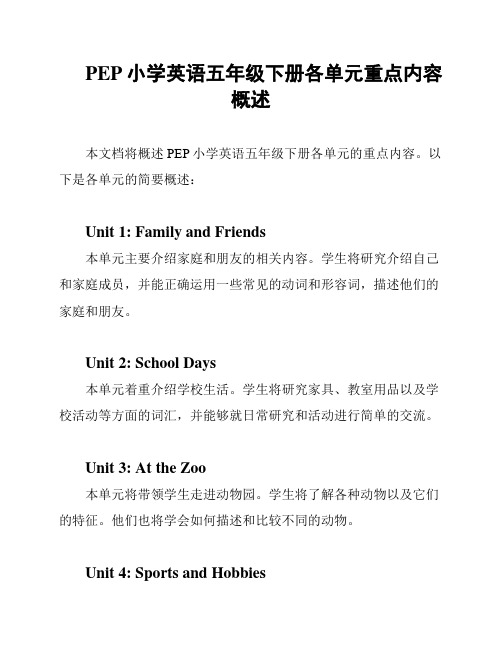
PEP小学英语五年级下册各单元重点内容概述本文档将概述PEP小学英语五年级下册各单元的重点内容。
以下是各单元的简要概述:Unit 1: Family and Friends本单元主要介绍家庭和朋友的相关内容。
学生将研究介绍自己和家庭成员,并能正确运用一些常见的动词和形容词,描述他们的家庭和朋友。
Unit 2: School Days本单元着重介绍学校生活。
学生将研究家具、教室用品以及学校活动等方面的词汇,并能够就日常研究和活动进行简单的交流。
Unit 3: At the Zoo本单元将带领学生走进动物园。
学生将了解各种动物以及它们的特征。
他们也将学会如何描述和比较不同的动物。
Unit 4: Sports and Hobbies本单元将探讨体育和爱好。
学生将研究描述不同体育运动和爱好的词汇,并能够就自己的喜好进行表达。
Unit 5: Food and Health本单元将关注食物和健康。
学生将研究各种食物的名称和描述,同时也会探讨健康和饮食惯的重要性。
Unit 6: My Neighborhood本单元将介绍学生所在的社区。
学生将研究描述自己的住所和周围环境的词汇,并能够就不同位置进行简单的指示。
Unit 7: Weather and Seasons本单元将涉及天气和季节。
学生将研究各种天气状况的词汇和描述,并了解不同季节的特点。
Unit 8: Holidays and Festivals本单元将介绍各种假期和节日。
学生将研究诸如春节、圣诞节等节日的名称和庆祝活动,并能够就个人喜好进行交流。
Unit 9: On the Farm本单元将带领学生了解农场。
学生将研究农场里各种动物和农作物的名称,并能够描述它们的特点。
Unit 10: Travel and Adventure本单元将聚焦旅行和冒险。
学生将研究描述不同交通工具以及旅行地点的词汇,并能够描述自己的旅行经历。
以上是PEP小学英语五年级下册各单元的重点内容概述。
五年级下册英语一至三单元的重点知识
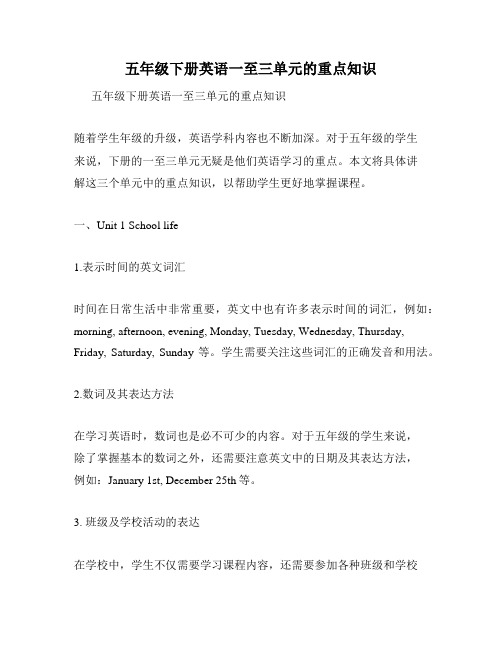
五年级下册英语一至三单元的重点知识五年级下册英语一至三单元的重点知识随着学生年级的升级,英语学科内容也不断加深。
对于五年级的学生来说,下册的一至三单元无疑是他们英语学习的重点。
本文将具体讲解这三个单元中的重点知识,以帮助学生更好地掌握课程。
一、Unit 1 School life1.表示时间的英文词汇时间在日常生活中非常重要,英文中也有许多表示时间的词汇,例如:morning, afternoon, evening, Monday, Tuesday, Wednesday, Thursday, Friday, Saturday, Sunday等。
学生需要关注这些词汇的正确发音和用法。
2.数词及其表达方法在学习英语时,数词也是必不可少的内容。
对于五年级的学生来说,除了掌握基本的数词之外,还需要注意英文中的日期及其表达方法,例如:January 1st, December 25th等。
3. 班级及学校活动的表达在学校中,学生不仅需要学习课程内容,还需要参加各种班级和学校活动。
学生需要掌握表示这些活动的常用词汇,例如:classroom, library, playground, sports day, school trip等。
二、Unit 2 Hobbies and interests1.频率副词的用法在英文中,频率副词指表示事件发生次数或频率的副词,例如:often, sometimes, always, never等。
学生需要明确这些副词的用法,并尝试在日常生活中使用它们。
2.谈论自己的爱好及兴趣在英语课上,教师会引导学生讨论自己的爱好及兴趣。
学生需要学会使用一些基本的英文表达方式,比如:I like…, I love…, My hobby is…等。
3.运动及体育活动的表达运动和体育活动是许多学生的兴趣爱好。
在英语课上,学生需要学习运动及体育活动的英文表达方式,例如:football, basketball, running, swimming, cycling等。
新起点五年级英语下册知识汇总

人教版新起点五年级英语下册知识要点汇总,预习必备Unit 1 Keep Healthy一、单元词汇小朋友,千里之行,始于单词哦too much 太多 candy 糖果go to bed 去睡;就寝 early 早exercise 锻炼 tired 困倦的;疲倦的drink 喝;饮 before 在......之前dirty 肮脏的 always 总是stomachache 胃疼 headache 头疼toothache 牙痛 a lot of 大量;许多sleepy 困的;欲睡的 subject 学科mark 分数 advice 建议 more 更多的二、单元句型小朋友,学会了这些句子,会变得更加优秀哦1. A: What's wrong 怎么了B: I've got a stomachache. 我肚子疼;2. A: I often have stomachaches. What should I do我经常肚子疼;我应该怎么办B: You should drink some water. 你应该喝些水;3. Here you are. 给你;4. A: Do you eat a lot of candy 你吃了很多糖吗B: Yes, I eat some after every class. 是的,我每节课后都吃很多;5. You shouldn't eat too much candy. 你不该吃太多糖;6. A: Do you wash your hands before eating 你饭前洗手了吗B: Not always. 不总洗;7. You shouldn't eat with dirty hands. 你不该用脏手吃饭;8. You should always wash your hands before eating.你应该坚持饭前洗手;9. I always feel tired and sleepy. 我总觉得很累很困;10. I have some advice for you. 我给你一些建议;11. Try these things. I think you'll soon feel better. 尝试这些;我觉得你很快就会感觉好起来的;三、四会单词和四会句型“听说读写”全都会感觉自己棒棒哒too much 太多 candy 糖果go to bed 去睡;就寝 early 早exercise 锻炼 tired 困倦的;疲倦的drink 喝;饮 before 在......之前dirty 肮脏的 always 总是stomachache 胃疼 headache 头疼toothache 牙痛1. A: What's wrong 怎么了B: I've got a stomachache. 我肚子疼;2. A: I often have stomachaches. What should I do我经常肚子疼;我应该怎么办B: You should drink some water. 你应该喝些水;3. You shouldn't eat too much candy. 你不该吃太多糖;四、重点音标从今天起, 做一个发音标准的英语侠ea /e/ head bread sweater weather healthy heavyea /i:/ speak meat tea cleanUnit 2 Special Days一、单元词汇小朋友,千里之行,始于单词哦New Year's Day 新年Tree Planting Day 植树节Mother's Day 母亲节 Children's Day 儿童节Father's Day 父亲节Teacher's Day 教师节National Day 国庆节Christmas Day 圣诞节birthday 生日 fifth5th 第五 tenth 第十twelfth 第十二 twenty-fifth 第二十五plant 种植 make a poster 制作海报celebrate 庆祝 have a picnic 野餐office 办公室 together 在一起 special 特别的二、单元句型小朋友,学会了这些句子,会变得更加优秀哦1. A: When is Tree Planting Day 植树节是什么时候B: It's on March 12th. 是3月12日;2. A: What do you do on that day 你那天做什么B: We often plant trees. 我们经常种树;3. A: What are you doing 你在做什么B: I am going to make a poster for Tree Planting Day.我要给植树节做一个海报;4. A: How are you going to celebrate it 你怎么庆祝它B: Before Tree Planting Day, we are going to read some books about trees. 在植树节前,我们要读一些和树相关的书;B: Then we are going to make a poster about trees.然后我们要做一张和树相关的海报;B: On Tree Planting Day, we are going to plant trees with our classmates. 在植树节,我们要和同学植树;B: After that, we are going to climb a hill and fly our kites. 在那之后,我们要爬山和放风筝;B: We are also going to have a picnic together. 我们要一起野餐;5. That sounds great. 哇;听起来不错;6. On Teachers' Day, children say "thank you" to their teachers. 教师节,孩子们对他们的老师道谢;7. Children can thank their fathers on Father's Day.孩子们在父亲节感谢他们的爸爸;8. Children can show their love to their mothers on Mother's Day.孩子们能在母亲节向妈妈示爱;9. They can make breakfast for them, or help them do chores.他们能给她们做早饭,或者帮她们做家务;10. Christmas is a special day in Western countries for all the family. 圣诞节对于西方国家和所有家庭来说都是特殊的一天;11. People give presents to their friends and family. 人们给朋友和家人送礼;12. Many people put Christmas trees in their homes, too.许多人还把圣诞树放在家里;三、四会单词和四会句型“听说读写”全都会感觉自己棒棒哒New Year's Day 新年Tree Planting Day 植树节Mother's Day 母亲节 Children's Day 儿童节Father's Day 父亲节Teacher's Day 教师节National Day 国庆节Christmas Day 圣诞节birthday 生日 fifth5th 第五 tenth 第十 twelfth第十二 twenty-fifth 第二十五 plant 种植make a poster 制作海报celebrate 庆祝 have a picnic 野餐1. A: When is Tree Planting Day 植树节是什么时候B: It's on March 12th. 是3月12日;2. A: What do you do on that day 你那天做什么B: We often plant trees. 我们经常种树;3. A: What are you doing 你在做什么B: I am going to make a poster for Tree Planting Day.我要给植树节做一个海报;4. A: How are you going to celebrate it 你怎么庆祝它B: On Tree Planting Day, we are going to plant trees with our classmates. 在植树节,我们要和同学植树;四、重点音标从今天起, 做一个发音标准的英语侠tr /tr/ try trick tree traveltr /dr/ dry drink dress driveUnit 3 Making Contact一、单元词汇小朋友,千里之行,始于单词哦send an email 发电子邮件write a letter 写信make a phone call 打电话send a short message 发送短消息mail a present 邮寄礼物make a video call 打视频电话say 说;讲make a card 制作卡片everywhere 到处 flower show 花展二、单元句型小朋友,学会了这些句子,会变得更加优秀哦1. A: What do you want to do on New Year's Day你新年想做什么B: I want to write a letter to my father. 我想给爸爸写一封信;2. It's Mother's Day tomorrow. 明天是母亲节;3. A: What would you like to do 你想做什么B: I would like to say "I love you" to my mother.我想和妈妈说“我爱你”;4. Well, you can make a card for your mother.好,你可以给你妈妈做一张卡片;5. You can write "I love you" on the card.你可以在卡片上写“我爱你”;6. That's a great idea. 听起来不错;7. I'd like to do that. 我喜欢做那些;8. I would like to go to Xin Yuan Park with my parents.我想和父母一起去心愿公园;9. Would you like to go with us 你想和我们一起去吗三、四会单词和四会句型“听说读写”全都会感觉自己棒棒哒send an email 发电子邮件write a letter 写信make a phone call 打电话send a short message 发送短消息mail a present 邮寄礼物make a video call 打视频电话say 说;讲make a card 制作卡片1. A: What do you want to do on New Year's Day你新年想做什么B: I want to write a letter to my father. 我想给爸爸写一封信;2. A: What would you like to do 你想做什么B: I would like to say "I love you" to my mother.我想和妈妈说“我爱你”;四、重点音标从今天起, 做一个发音标准的英语侠ight /at/ night light rightigh /a/ high sigh thighUnit 4 Last Weekend一、单元词汇小朋友,千里之行,始于单词哦Cleaned the window 过去式擦窗子watched TV 过去式看电视climbed a hill 过去式爬山visited grandparents 过去式看望祖父母danceddance的过去式跳舞jumped rope 过去式跳绳listened to music 过去式听音乐rowed a boat 过去式划船played computer games 过去式玩电子游戏stayed at home 过去式呆在家里played the piano 过去式弹钢琴played chess 过去式下棋washed clothes 过去式洗衣服boring 乏味的badminton 羽毛球won win的过去式赢;获胜二、单元句型小朋友,学会了这些句子,会变得更加优秀哦1. A: What did you do last weekend 你上周末做了什么B: I visited my grandparents. 我去拜访了祖父母;2. A: How was your weekend 你周末过得怎么样B: It was wonderful. 很棒;3. A: What did you do last weekend 你上周末做什么了B: I watched a football match with my friends, and then we played football together. 我和朋友看了足球赛,然后一起踢足球了;B: On Sunday, I played the violin in a music club. 周日,我在音乐社拉小提琴了;A: That really sounds fun. 听起来很有趣;4. A: How was your weekend 你的周末怎么样B: It was great on Saturday. 周六很棒;B: It was rainy in the afternoon. 下午在下雨;B: I played in the rain. It was a lot of fun. 我在雨中玩;很有趣;A: Wow, that was cool. 哇,那很酷;5. A: What did you do last Sunday 你上周日做了什么B: I stayed in bed all day. I was ill. 我一直呆在床上;我病了;A: Oh, what a pity I'm sorry to hear that.哦,太遗憾了我很抱歉听到这个消息;三、四会单词和四会句型“听说读写”全都会感觉自己棒棒哒Cleaned the window 过去式擦窗子watched TV 过去式看电视climbed a hill 过去式爬山visited grandparents 过去式看望祖父母danceddance的过去式跳舞jumped rope 过去式跳绳listened to music 过去式听音乐rowed a boat 过去式划船played computer games 过去式玩电子游戏stayed at home 过去式呆在家里played the piano 过去式弹钢琴played chess 过去式下棋washed clothes 过去式洗衣服boring 乏味的1. A: How was your weekend 你周末过得怎么样B: It was wonderful. 很棒;2. A: What did you do last weekend 你上周末做什么了B: I watched a football match with my friends, and then we played football together. 我和朋友看了足球赛,然后一起踢足球了;四、语音知识从今天起, 做一个发音标准的英语侠动词过去式字母组合ed的发音规则:在清辅音后的发音为/t/,如:helped, asked在浊辅音和元音后的发音为/d/,如:stayed,learned在t, d后的发音为/d/,如: wanted, needed五、语法知识一般过去时1. 含义:过去某个时间里发生的动作或状态;过去习惯性、经常性的动作或行为;过去主语所具备的能力和性格;2. 时间标志词:yesterday, last week...3. 结构:1陈述句肯定形式:主语 + 动词过去式 + 其他.否定形式:主语 + didn't + 动词原形 + 其他.2一般疑问句①Did + 主语 + 动词原形 + 其它②Was/Were + 主语 + 表语3特殊疑问句疑问词 + did + 主语 + 动词原形 + 其他4. 变化规则:1规则变化①动词 + ed;②不发音e结尾的单词,只加d;2不规则变化:①A-A型原形和过去式同形:如:let, put, read, cut, cost②A-B型原形和过去式不同:如:come-came, run-ranUnit 5 Have a Great Trip一、单元词汇小朋友,千里之行,始于单词哦went to the beach 过去式去海边drank cold drinks 过去式喝冷饮swam swim的过去式游泳ate ice-cream 过去式吃冰淇淋the Stone Forest 石林bought some gifts 过去式买礼物took photos 过去式拍照片saw flowers 过去式赏花slept sleep的过去式睡觉delicious 美味的felt happy 过去式觉得高兴sad 悲哀的 left leave过去式离开French fries 法式炸薯条were are的过去式是二、单元句型小朋友,学会了这些句子,会变得更加优秀哦1. A: How was your summer vacation 你暑假过的怎么样B: It was fun. 很有趣;2. A: Where did you go 你去了哪B: I went to Beijing with my parents. 我和父母一起去北京了;3. A: What did you do there 你在那里做了什么B: We went to Beijing Zoo and saw many lovely animals there. 我们去了北京动物园,看了很多可爱的动物;4. We took lots of photos in Tian'anmen Square. 我们在天安门广场照了很多照片;5. We also ate Beijing duck. It was delicious 我们还吃了很多北京烤鸭;很美味6. We went to the Summer Palace. 我们去了颐和园;7. I rowed a boat on Kunming Lake. 我们在昆明湖划船了;8. I felt very happy. 我觉得很开心;9. That sounds like a great trip. 听起来是场很棒的旅行;三、四会单词和四会句型“听说读写”全都会感觉自己棒棒哒went to the beach 过去式去海边drank cold drinks 过去式喝冷饮swam swim的过去式游泳ate ice-cream 过去式吃冰淇淋the Stone Forest 石林bought some gifts 过去式买礼物took photos 过去式拍照片saw flowers 过去式赏花slept sleep的过去式睡觉delicious 美味的felt happy 过去式觉得高兴1. A: How was your summer vacation 你暑假过的怎么样B: It was fun. 很有趣;2. A: Where did you go 你去了哪B: I went to Beijing with my parents. 我和父母一起去北京了;3. A: What did you do there 你在那里做了什么B: We went to Beijing Zoo and saw many lovely animals there. 我们去了北京动物园,看了很多可爱的动物;四、重点音标从今天起, 做一个发音标准的英语侠le /l/ apple maple bottle turtle table bubbleUnit 6 Growing Up一、单元词汇小朋友,千里之行,始于单词哦was born 出生started to speak 过去式开始说话learned to walk 过去式学走路learned to ride a bike 过去式学骑自行车went to kindergarten 过去式上幼儿园went to school 过去式上学learned to swim 过去式学游泳fifteenth15th 第十五started to buy things 过去式开始学买东西started to study English 过去式开始学英语started to use a computer 过去式开始使用电脑all over 到处out of 离开某处into 进入chopsticks 筷子wet 湿的二、单元句型小朋友,学会了这些句子,会变得更加优秀哦1. A: Tell us one of your growing-up stories and talk about your photos. 告诉我们你的成长故事之一,谈谈你的照片吧;B: I was born on May 15th, 2004. 我出生于2004年5月15日;B: I started to speak when I was ten months old.我十个月时开始说话的;2. A: When did you start to use a computer你什么时候开始用电脑的B: When I was four. What about you 四岁;你呢I started when I was six. 我六岁开始的;3. A: When did you start to buy things 你什么时候开始买东西的B: When I was five. I bought an ice-cream.在我五岁的时候,我买了一个冰淇淋;4. A: What did you learn to do when you were five你五岁的时候在学什么B: When I was five, I learned to swim and started to study English.我五岁的时候,开始学游泳和英语;5. A: When did you go to kindergarten 你什么时候去的幼儿园B: Oh, I went to kindergarten when I was three.哦,我三岁去的幼儿园;A: Me too. 我也是;三、四会单词和四会句型“听说读写”全都会感觉自己棒棒哒was born 出生started to speak 过去式开始说话learned to walk 过去式学走路learned to ride a bike 过去式学骑自行车went to kindergarten 过去式上幼儿园went to school 过去式上学learned to swim 过去式学游泳fifteenth15th 第十五started to buy things 过去式开始学买东西started to study English 过去式开始学英语started to use a computer 过去式开始使用电脑1. A: When did you start to use a computer你什么时候开始用电脑的B: When I was four. What about you 四岁;你呢I started when I was six. 我六岁开始的;四、语音知识从今天起, 做一个发音标准的英语侠1. 在同一个重读音节或次重读音节内, 清辅音/p/前的音是/s/, 且清辅音/p/后还有元音时,sp组合中p的发音是/b/;如:sports spring speak2. 在同一个重读音节或次重读音节内, 清辅音/k/前的音是/s/, 且清辅音/k/后还有元音时,sk组合中k的发音是/g/;如:skate ski skirt。
五年级三四单元重点知识

五年级下册三四单元重点知识
1.when is April Fool’s Day?
①当节日是以......Day结尾的,以及西方的传统节日,这句话不需要加the。
(我们目前所学的所有节日单词都符合这个要求,所以这句话我们不需要加the)
②当节日是以......festival结尾的以及中国的一些传统节日加the。
(这个作为课外知识,知道就行。
)
2.It’s on April 1st.
It’s in April.
当表示具体的某一天的时候前边的要用on 当表示在某个月份的时候前边要用in
1st的书写形式为
3.问句:What will you do for your mom?(你要为你的妈妈做些什么?)
(为你的妈妈)
当看到will的时候就知道这是一个将来句式,表示将来要发生的事情。
答语:I will cook noodles for her.(我会为她做长寿面。
)
注意:will后边所跟的动词为原形
What will you/he/she ..........?
I will............................。
五下1234单元英语总结

五下1234单元英语总结一、单元概述五下1234单元是小学英语教材中的重要部分,内容涵盖了语言基础知识、听说读写等方面。
通过学习这些单元,学生们可以扩大词汇量,提高朗读和听力技能,培养对英语的兴趣和自信心。
本篇文档将对五下1234单元的内容进行总结,帮助学生们更好地了解和掌握这些知识点。
二、具体内容1. 第一单元第一单元主要学习了关于问候和介绍的知识。
学生们通过这个单元,学会了用英语与人打招呼和自我介绍。
同时,还学习了一些关于国家和语言的表达方式。
2. 第二单元第二单元着重学习了一些关于家庭的词汇和表达方式。
学生们可以描述家庭成员的姓名和职业,并能够用简单的句子表达家庭成员之间的关系。
3. 第三单元第三单元以“学校生活”为主题,学生们学习了一些关于学校和课堂的词汇,还学会了问答有关上学日常活动的问题。
4. 第四单元第四单元主要学习了一些与食物和饮料相关的词汇。
学生们能够用简单的句子表达喜欢和不喜欢的食物,并学会了与他人一起点餐的基本表达方式。
三、学习方法学习英语需要良好的学习方法和习惯。
下面给出几点建议,帮助同学们有效地学习五下1234单元的内容:1.多与他人练习对话:与他人练习对话是提高口语表达能力的有效方法。
可以与同学们一起组队练习对话,并互相纠正发音和语法错误。
2.多做课后习题:课后习题是巩固所学知识的好方法。
可以找同学之间相互出题答题,也可以向老师请教不懂的地方。
3.利用多媒体资源:在学习英语的过程中,可以借助多媒体资源,如英语学习软件、英语歌曲和视频等。
这些资源可以帮助同学们扩展词汇量,提高听力和阅读能力。
4.保持良好的学习习惯:学习英语需要持之以恒的努力,要保持每天都抽出一定时间进行学习,并养成复习和总结的习惯。
四、小结通过五下1234单元的学习,同学们不仅掌握了基础的英语词汇和表达方式,还培养了一定的听说读写技能。
希望同学们能够在今后的学习中继续努力,不断提高自己的英语水平。
以上是五下1234单元英语的总结,希望对同学们的学习有所帮助。
PEP小学英语五年级下册第三、四单元知识点整理
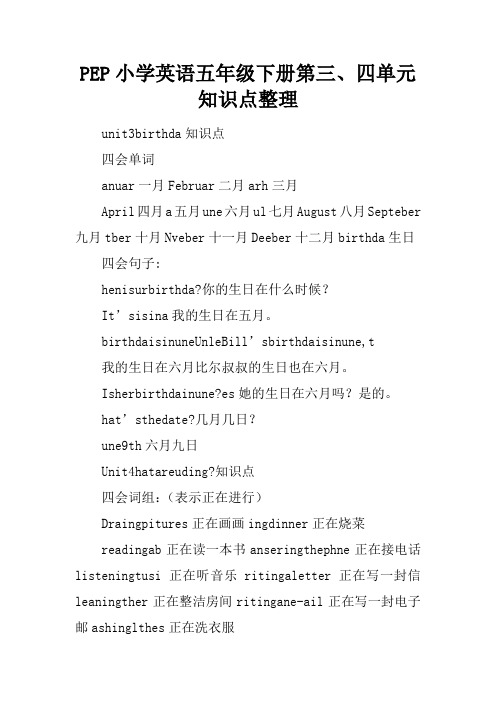
PEP小学英语五年级下册第三、四单元知识点整理unit3birthda知识点四会单词anuar一月Februar二月arh三月April四月a五月une六月ul七月August八月Septeber 九月tber十月Nveber十一月Deeber十二月birthda生日四会句子:henisurbirthda?你的生日在什么时候?It’sisina我的生日在五月。
birthdaisinuneUnleBill’sbirthdaisinune,t我的生日在六月比尔叔叔的生日也在六月。
Isherbirthdainune?es她的生日在六月吗?是的。
hat’sthedate?几月几日?une9th六月九日Unit4hatareuding?知识点四会词组:(表示正在进行)Draingpitures正在画画ingdinner正在烧菜readingab正在读一本书anseringthephne正在接电话listeningtusi正在听音乐ritingaletter正在写一封信leaningther正在整洁房间ritingane-ail正在写一封电子邮ashinglthes正在洗衣服四会句子:ThisisZhangPeng。
我是张鹏。
hatareuding?你正在干什么?I’dingthedishes我正在洗盘子。
I’readingab我正在读一本书。
Grandpaisritingaletter爷爷正在写一封信。
Brtherisdingher哥哥(弟弟)正在做家庭作业。
isingdinnerintheithen妈妈正在厨房里烧菜。
He’sritingane-ailinthestud他正在书房里写一封电子邮。
冀教版本英语小学五年级的下册的第三四单元总结复习

五年(下) Unit 340.: much(与 how 用以数目)多少;很;非常 write写mum(非正式用)did爸爸(非正式用) dear的fine健康的;明朗的left左的;左 right右的;右turn向;弯wrong的 email子件(an email)postcard明信片letter信idea想法;想法computer use使用;利用kind友善的;体的us我(we的格形式)stamp . 票。
41. 短: write an email/write emails 写子件write a postcard/ write postcards 写明信片write a letter/write letters 写信send⋯to ⋯把⋯ .. 寄/ 送⋯buy some postcards一些明信片a picture of 一⋯的画42. These are postcards . 些是明信片。
A postcard has a picture on it . 明信片上有一片。
43. This is a letter . 是一封信。
We write a letter on paper . 我在上写信。
44. This is an email . 是一封子件。
We write an email on a computer .我在上写子件。
45.This postcards has a picture of the Palace Museum!明信片上有一故的片。
46. I want to send this postcard to my mum and dad .我想我的爸爸寄明信片。
47.May I see that postcard我能看一下明信片Sure . 自然。
48. How much is this postcard明信片多少It ’ s two yuan .两元。
I ’ ll take nine .我要九。
PEP五年级英语下册Unit 3 My school calendar和 Unit 4 When is Easter两单元知识点总结

Unit Three和Unit Four 两单元知识点总结⒉关于时间介词:⑴指在某一月份内,in+月份,如:in January ,in May⑵指在几点钟时,at+时间,如:at 8:00⑶指具体某一天,或星期几时,on+日期、星期,如,on June 5th,on Monday⒊关于序数词的写法与读法:如:10月3日,写作:October 3rd;读作:October the third4、询问某节日在哪一天?When is + 节日?——When is Tree Planting Day ?——It’s in +月份.——When is the sports meet ?——It’s on +具体日期. It’s on April 4th .询问生日的时间:——When is your / his / her/ your Grandpa’s birthday? 你的/ 他的/ 她的生日在什么时候?—— My / his / her/ your Grand pa’s birthday is in June. 在六月。
——My / his / her/ your Grandpa’s birthday is on April 4th . 在四月四日。
作文:你的家里有几口人?他们都是谁?你知道他们的生日日期分别是什么时候吗?你能用英语向大家介绍一下你和你的家人吗?现在根据以下内容,写一篇不少于50个词的小短文。
提示:1、我叫Amy ,今年11岁,生日是9月12日。
2、家庭人数:3人,分别是爸爸、妈妈和我。
3、爸爸生日:10月3日,妈妈生日:6月18日。
作文指导:短文中涉及许多日期,写作时要注意英语日期的正确表达方式以及基数词和序数词的运用。
句子提示:My name is ……I am ……years old now. There are ……people in my family . My father’s /mother’s birthday is …….My name is Amy . I am eleven years old now . My birthday is on September 12th . There are three people in my family . They are my father, my mother and I. My father’s birthday is on October 3rd .He is forty-one years old . My mother’s birthday is on June 18th . She’s thirty-nine years old . I have a happy family .。
五年级下英语3-4单元要点总结
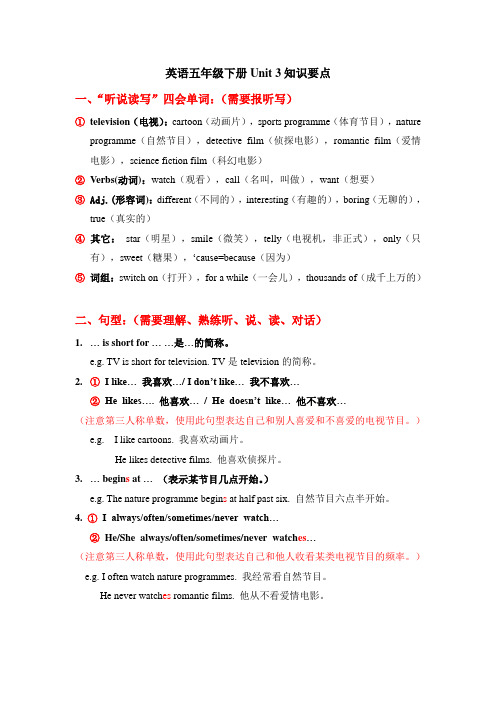
英语五年级下册Unit 3知识要点一、“听说读写”四会单词:(需要报听写)①television(电视):cartoon(动画片),sports programme(体育节目),natureprogramme(自然节目),detective film(侦探电影),romantic film(爱情电影),science fiction film(科幻电影)②Verbs(动词):watch(观看),call(名叫,叫做),want(想要)③Adj.(形容词):different(不同的),interesting(有趣的),boring(无聊的),true(真实的)④其它:star(明星),smile(微笑),telly(电视机,非正式),only(只有),sweet(糖果),‘cause=because(因为)⑤词组:switch on(打开),for a while(一会儿),thousands of(成千上万的)二、句型:(需要理解、熟练听、说、读、对话)1.… is short for ……是…的简称。
e.g. TV is short for television. TV是television的简称。
2.①I like…我喜欢…/ I don’t like…我不喜欢…②He likes….他喜欢…/ He doesn’t like…他不喜欢…(注意第三人称单数,使用此句型表达自己和别人喜爱和不喜爱的电视节目。
)e.g. I like cartoons. 我喜欢动画片。
He likes detective films. 他喜欢侦探片。
3.… begin s at …(表示某节目几点开始。
)e.g. The nature programme begin s at half past six. 自然节目六点半开始。
4. ①I always/often/sometimes/never watch…②He/She always/often/sometimes/never watch es…(注意第三人称单数,使用此句型表达自己和他人收看某类电视节目的频率。
- 1、下载文档前请自行甄别文档内容的完整性,平台不提供额外的编辑、内容补充、找答案等附加服务。
- 2、"仅部分预览"的文档,不可在线预览部分如存在完整性等问题,可反馈申请退款(可完整预览的文档不适用该条件!)。
- 3、如文档侵犯您的权益,请联系客服反馈,我们会尽快为您处理(人工客服工作时间:9:00-18:30)。
熟练掌握书上P74-P77词汇表单词熟练掌握书上P78-P79四会句子课文中重点词汇、句型总结UNIT 3 Welcome to our school!
一词汇:
1.欢迎来到…___________
2. 我们的校长___________
3.带…参观___________
4.借书___________
5.从…借来___________
6.来到图书馆___________
7.制作东西___________
8.读故事书___________
9.画画___________10.欣赏画___________11.讲英语___________12.读故事___________13.上美术课___________14.科学实验室___________15.上科学课___________16.语音室___________17.一周两次___________18.上美术课___________19.唱歌跳舞___________20.做听力练习___________21.讲口语___________22.做阅读练习___________23.做写作练习___________24.许多其他的活动___________25.做实验___________26.观察事物___________27.新建筑物(新教学楼)___________30.会议室___________31.开会___________32.表演___________33.在儿童节___________34.在新年___________35.音乐俱乐部___________36.对…感兴趣___________37.擅长某事___________38.擅长做某事___________39.弹钢琴___________40.拉小提琴___________41.听音乐___________42.想要做某事___________43.在美术俱乐部___________44.完成某事___________45.一副剪刀___________46.向上下移动___________47.玩某物___________48.从纸上剪下来___________(44-47在FUN STORY)二句型:
1.请这边走。
________________________
2. 让我带你们到处参观一下。
________________________
3.你们经常来图书馆么?________________________ 答语:______________
4.那很好________________________
5.我们经常从图书馆借书。
________________________
6.我们在图书馆里面看书。
________________________
7.这是我们的科学实验室。
________________________
8.你们多久上一次科学课?________________________ 答语:
9.你们一周有多少节英语课?________________________ 答语:_____________________
10.你们在英语课上干什么?________________________ 答语:________________________
11.你喜欢英语么?________________________是的。
我们都非常喜欢英语。
___________________
12.我们一周有三节英语课。
________________________13.这里是我们的音乐俱乐部。
______________ 14.我擅长弹钢琴。
________________________15.你现在能弹奏么?________________________16.当然____________17.我对美术非常感兴趣。
________________________
默写LESSON 15
Unit 4 Is there a library in your class?
一词汇:1.来自______________2. 向某人展示_________________3.英国学生如何学习_________________4.按小组_________5.做小组活动_________________6.在计算机角_________________7.研究动物和植物_________________8.观看卡通片_________________9.读故事书_________________10.计算机角________________11.美术角________________12.做项目制作________________13.在纸上印刷________________14,。
在澳洲________________15.来到高伟的学校________________16.展示________________17观看视频________________18因。
而著名________________19.许多球类运动________________20.踢足球________________21.打篮球________________22.打曲棍球________________23.打排球________________24.下棋________________25.做操________________26.打鼓________________27.弹钢琴________________28.拉小提琴________________29告诉某人关于某事________________30.在一座小城市________________31.在美国________________32.因为________________33.。
怎么样?________________34.有某事要做________________35.进行田地考察________________36.去森林________________37.去农场________________38.研究真实的事物________________39.在画树和花________________40.研究农民的工作________________41.社会研究________________42.在布上印染________________
二 1. 你们的教室里有图书馆么?________________________________ 答语:________________
________________
2.你们能在图书馆里做什么?___________________________答语:__________________________
3.你们在哪踢足球?________________________答语:______________________________
4.有适合女孩的游戏么?________________答语:________________
5.看!他们正在打曲棍球。
________________
6.你能告诉我关于你和你们学校的事情么?______________________________________________ 7.我喜欢我们学校因为我们的课程是很有趣的并且我们的老师是很友善的。
______________________________________________________________________________________
8.我也来自美国。
________________
9.我们有许多项目要做。
______________________________
10. 我们经常进行田地考察。
__________________________________
11. 我们去森林或农场。
_______________________________
12. 我们在田地研究真实的事物。
_____________________________。
